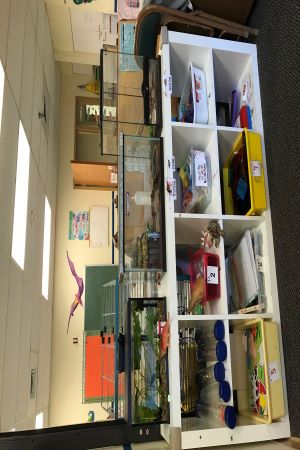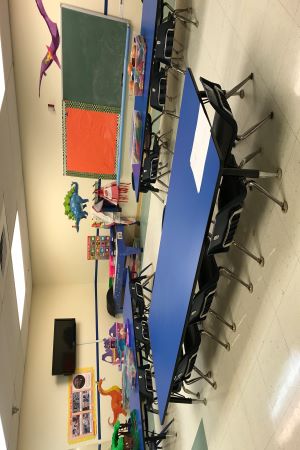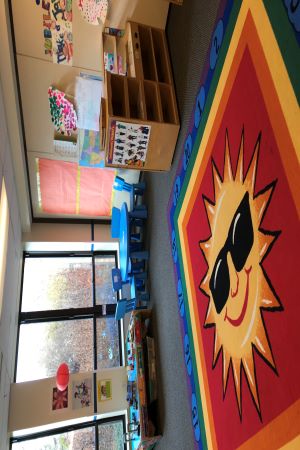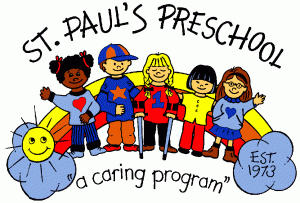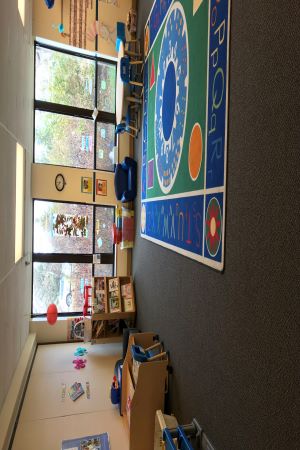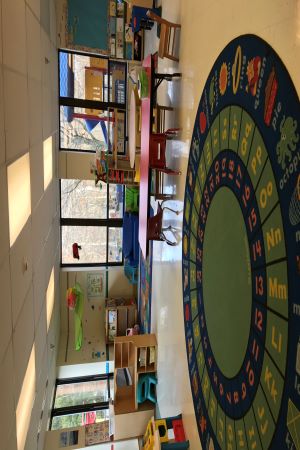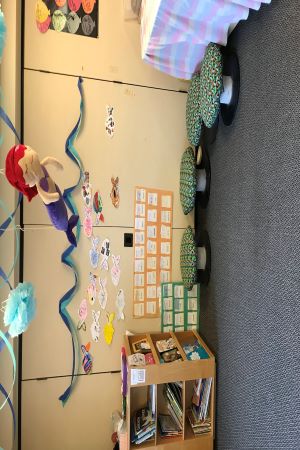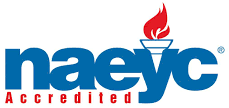Director's Corner
AN UNDERSTANDING OF THE PA EARLY CHILDHOOD STANDARDS
Summer 2024
St. Paul’s Preschool follows the Pennsylvania Early Standards as we create and adapt our curriculum to the various age groups within our school. Each month I will examine one of the standards we are focusing on in the classes and explain how the teachers are implementing it into their curriculum.
Partnerships for Learning: Families, Early Care and Education programs and Communities
PL 7: Families are supported in times of transition
In anticipation of the first month of preschool, there are some steps parents can take during the summer months to help prepare their children for the transition from the home environment to the school environment.
- Step up the child’s social life- Organize play dates for your child prior to starting preschool so he/she becomes comfortable with the idea of sharing and playing alongside lots of different children.
- Play listening and direction games-traditional games such as “Simon Says” help a child to understand how to listen and follow directions.
- Read during the day- bedtime stories are a wonderful experience for children but sitting together during the day and reading a book for 15 minutes will help children learn to sit and settle.
- Visit the preschool beforehand-take a visit to the preschool before the first day of school arrives so your child is familiar with the surroundings. We have scheduled a “Preview Day” on Thursday, August 29, 2024. Please feel free to bring your child to the classroom to meet some of the staff and to see the room at the scheduled time for your child’s age group.
- Buy a special preschool bag- together spend some time looking at all the different styles and options and then choose three that you are happy with and let your child pick his/her own from those. Limiting the choice helps your child decide and prevents disappointment when he/she wants the bag that is bigger than him/her!
- Put a family photo in the preschool bag- choose a family photo for your child to take to preschool and let them know they can look at it during the day when they are missing you. Remember to tell the teacher about this so he/she can understand when your child suddenly races off to go searching through their bag.
- Together plan a goodbye game-come up with a special game for when it’s time to say goodbye. It could be a certain number of hugs followed by the biggest hug in the world! Never sneak out when your child is not looking as they will be frightened and feel abandoned.
- Plan a celebration breakfast-make a fuss over breakfast on the first morning of preschool. Plan it together beforehand and make it special!
- Make a “Starting Preschool” certificate-create your child’s very own “Starting Preschool” certificate and present it to him/her over breakfast as an award. Your child will feel very important and perhaps those fears won’t seem so scary!
- Be informed. Parents need to be prepared for preschool too. Talk to the director and the preschool teachers to find out as much information as you can about your child attending preschool. If you know about the new routines and experiences your child will encounter, you will be ready to answer any questions they might have, such as: How will I get there? How long will I be there? How many days do I have to go? What if I want to go to the toilet? What room will I be in and what am I going to do there? What room will I be in and what am I going to do there? Will I get to play? The first day of school can be an anxious experience for both you and your child. Preparing your child for preschool by answering all their questions honestly and in as much detail as they can understand can curb potential anxieties.
- Encourage independence- children who can care for themselves, and their belongings will feel more confident at preschool. Parents can encourage children to practice personal hygiene, such as wiping their nose and toileting independently. Help your child to feel confident and independent by dressing them in clothing which is simple enough for them to manage with little adult help. Children who assist in packing their bag at home each morning will readily identify their own belongings during the day.
- Label equipment and clothing- children’s belongings may look very similar to their classmates’. Labeling your child’s equipment and clothing with their name will help prevent loss, confusion, and possible upset for your child.
- Share information with the preschool teacher-children learn best when parents and teacher share together in a partnership. Your child’s preschool teacher has many students to get to know. Because you know your child best, you can help the teacher understand your child by sharing information, concerns, and insights. Regular communication between parents and teachers bridges the gap between home and preschool and provides opportunities to exchange information that supports children’s learning.
- Keep the preschool teacher informed of changes-changes to your child’s family situation can impact on their emotional and academic well-being. If you keep your child’s teacher informed of any changed circumstances the child can be supported, if necessary. Examples of changes include the birth of a sibling; moving to a new house; divorce or separation or the death of hospitalization of a loved one. It is also important to notify the school of changes to contact details, such as address and emergency telephone numbers.
Parent Orientation meetings will be held during the month of August. The director and classroom staff will discuss important information all parents need for the start of the school year.
Parents can also access the Parent Handbook listed on this website for a wealth of information about the school, the curriculum, and our policies.
QUESTIONS FOR THE DIRECTOR
Each month I will focus on a question or two from the parents. Please email your questions to the director at:
QUESTION: I notice that the class sizes seem large. Is this something I should worry about? Will my child get the attention and education he needs in this type of large class?
ANSWER: This is a good question and one that I often hear from parents unfamiliar with our program. As a state licensed Star FOUR and NAEYC accredited program, we MUST adhere to the strict staff: child ratios within the classroom. The staff: child ratios are:
- Older Toddler (a child 2-3 years of age) 1:6
- Preschool (children ages 3 to date starting Kindergarten) 1:10
We can have up to 15 children in the Lavender Class (2 Day/2-year-olds) with 3 staff. Ratio is 1:5
We can have up to 21 children in the Turquoise Class (3 Day/3-year-olds) with 3 staff. Ratio is 1:7
We can have up to 21 children in the Red and Green classes (2 Day/3-year -olds) with 3 staff. Ratio is 1:7
We can have up to 24 children in the Orange, Yellow and Blue classes (3 Day/4-year-olds) with 3 staff. Ratio is 1:8
We can have up to 24 children in the Purple and Gold classes (4 Day/5-year -olds) with 3 staff. Ratio is 1:8
As you can see, we are below the required staff: child ratio. This gives the teaching staff more time to work individually with the children!
The children will be together in a large group at the beginning of the day when they are all arriving, for our beginning of the day circle time, for snack and for the ending day circle and dismissal time. For most of the day, the children are split into smaller groups (3 groups per class). This enables the children to have plenty of one-on-one time with each teacher as they are learning specific skills.
QUESTION: Are any of the teachers trained in first aid or CPR? Who takes care of my child if she has an accident?
ANSWER: Another great question! All the St. Paul’s teaching staff as well as the director are trained in pediatric first aid and CPR. They are also trained in how to use an AED (defibrillator) and Epi-pens (for allergies). This is a requirement for employment and the certificates must be current. They are renewed every two years. All staff know how to treat childhood injuries and illnesses. The emergency procedures we follow are listed in your parent handbook on page 13. The handbook is available in the parent section on this website.
LET ME INTRODUCE YOU TO…
Laurel Webster, St. Paul's Preschool Director
I have been working for St. Paul’s Preschool since September 1993. Before I began as a teacher, I was an active parent whose 4 children were students at St. Paul’s Preschool! I began as a teacher and have worked with all the age groups: 2-year-olds, 3-year-olds, 4-year-olds and 5-year-olds. I moved up to the Head Teacher position for three years (at the time St. Paul’s Preschool had 3 separate locations in the North Hills) and then moved into the Assistant Director position for the next three years, working under Georgia Couch (the very first preschool director and my fabulous mentor). I worked as a Co-Director for four years, (working between the Ferguson Road Center and the McKnight Center), which enabled me to teach as well as function as an administrator. For the past 14 years, I have been the sole director of St. Paul’s Preschool. It has been and continues to be a joy for me!
I also work as an adjunct faculty member at CCAC, teaching Early Childhood and Education courses in the evenings. This helps me keep up with any new developments in the field of early childhood education. I also enjoy helping to train new early childhood teachers!
I have a B.A. degree in English from California State University of Pa. and a MEd in Early Childhood Education from the University of Pittsburgh.
I serve as an Early Childhood Administrator on the North Hills P-3 Elementary School Team. This group was an initiative created by the Office of Child Development and Early Learning, the PA Departments of Education and Human Services and our state leadership. The purpose of the P-3 Collaboration is to help school districts, early learning providers, and community organizations throughout the commonwealth make the vital connections and collaborations necessary for student success from prenatal development through third grade.
I am a member of St. Paul’s United Methodist Church.
One of the most rewarding times of the day for me are the times I visit the classrooms and see all the wonderful ways the children are learning. Each child is unique and learns in his/her own way. Children are creative with materials and are so curious about how things work and “what might happen if I do this?” I watch children try to work together to build “the tallest building in the world” or measure how many “Legos long a stuffed animal may be”! I love all the wonderful personalities which come together to create each class!
I have 8 grandchildren (and one on the way!) to cherish, and watch grow into their own special selves! I don’t have any pets at home anymore but enjoy watching beautiful birds visiting our many bird feeders and making homes in our various bird houses.
My favorite color is green! I love to eat Indian food! You might see me either walking around North Park or riding my bike around the lake!
I am so honored to be able to be a part of each child’s education and early development. What a wonderful place to work!
